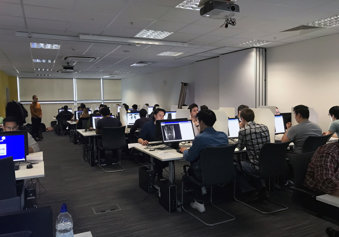FRCR Part 1 (Radiology) - CR1 - purpose of assessment statement (physics)
LEARN MOREExam Preparation Course: 28 - 29 April 2025
This two-day online course will provide attendees with a comprehensive understanding of the scientific principles of medical imaging, specifically tailored to the requirements of the CR1 physics exam.
The First FRCR examination (Scientific Basis of Imaging) assesses knowledge of those physical, cellular and molecular principles that underpin the generation of radiological studies.
The purpose of this examination is to assess whether those undertaking specialty training in clinical radiology have an appropriate knowledge of the scientific principles that underpins all radiological imaging including radiography, fluoroscopy, angiography, computed tomography (CT), ultrasound imaging, radionuclide imaging and magnetic resonance imaging (MRI). As the knowledge assessed in this examination is essential to clinical radiology practice, this
examination should be completed during the first year of clinical radiology training (ST1).
The syllabus for this examination is described in the Guidance for the First FRCR exam. The examination ensures that successful candidates understand the underlying principles that underpin the generation of images in the various modalities, such that they can:
- Select the most appropriate imaging technique for a clinical scenario from the intrinsic properties of the method of image generation (Syllabus 2.1)
- Understand the risk, safety and quality consideration that are inherent in image generation to allow an informed choice of the appropriate modality and any alteration in technique (Syllabus 2.2 & 2.3)
- Demonstrate that the requirements of legislation that require the use of those techniques that require ionising radiation to be justified by a professional had been met (Syllabus 2.4)
Image production is fundamental to clinical radiology for several reasons:
- a sufficient understanding of method of production is necessary to be able to make an informed choice of the various modalities available, and to make any necessary adjustments to the technique for a given situation
- radiologists need a thorough knowledge of production methods to understand the various artefacts that may complicate a radiological study
- radiologists need to be able to understand the various risks that may accompany a radiological study, both to make an informed choice of the modalities, communicate any risks to the patient and/or clinicians, and to fulfil the requirements of the legislative requirements requiring justification of imaging studies; especially those involving ionising radiation
- understand the various aspect that may need to considered when thinking about the use or commissioning of different machines
Most imaging techniques involve the possibility of harm. Radiological expertise often involves the selection of the appropriate imaging technique that best answer the question posed, with the least risk to the patient taking into account any variation in technique that may be required in the individual case. Although many imaging strategies appear well developed, as technologies change this can lead to different approaches, based on the balance of inherent image generation characteristics, image quality and risks.
Each imaging technique has its different underlying fundamental basis which determines its underlying quality, risk and possibility of modification. This unique nature of radiological image recognition mandates a specific education in, and subsequent demonstration of,
knowledge of the underlying techniques.
Whilst it is difficult to directly relate the fundamental science to direct image interpretation, its importance cannot be understated, both on an individual patient and strategic level - this is reflected in the requirement for a separate examination.
Our exams
Find out more about our FRCR exams in clinical radiology and clinical oncology, and DDMFR exams in dental and maxillofacial radiology.
